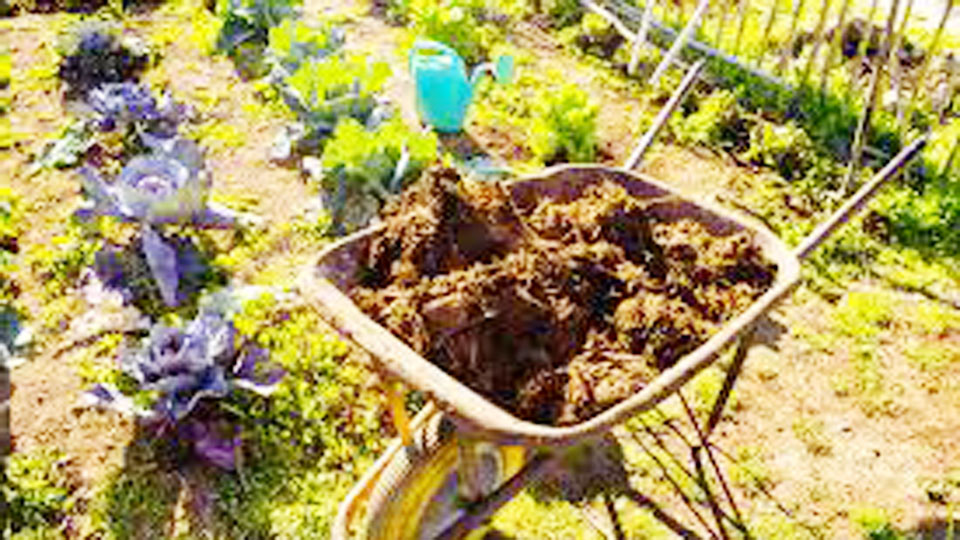Gardening has always been a rewarding experience for me, especially when growing my own vegetables. One of the biggest lessons I’ve learned over the years is that healthy soil leads to healthy plants. And nothing boosts soil health quite like animal manure.
But not all manure is created equal. Some types are better suited for vegetable gardens, while others can do more harm than good. If you’ve ever wondered what animal manure is best for vegetable gardening, you’re in the right place.

Image by moowy
I’ve experimented with different types of manure in my garden, and I can tell you firsthand that choosing the right one makes all the difference.
Some break down quickly and enrich the soil with essential nutrients, while others need special handling before they’re safe to use. Let’s explore the best animal manure options for vegetable gardening and how to use them effectively.
Why Use Animal Manure in Vegetable Gardening?
Animal manure has been used in gardens for centuries, and for good reason. It’s one of the most natural and effective ways to improve soil health. Here’s why manure is so beneficial:
Boosts Soil Fertility – Manure is rich in nitrogen, phosphorus, and potassium, which are essential nutrients for plant growth.
Improves Soil Structure – It helps sandy soil retain moisture and prevents clay soil from becoming compacted.
Encourages Microbial Activity – Manure feeds the beneficial microbes in the soil, leading to healthier plants.
Reduces the Need for Chemical Fertilizers – Using manure naturally enriches the soil, making synthetic fertilizers unnecessary.
However, not all manure is ideal for vegetable gardens. Some types can introduce harmful bacteria or contain too much nitrogen, which can burn plants if not used correctly. That’s why it’s important to choose the right manure and prepare it properly.
Best Animal Manure for Vegetable Gardening
Different types of manure have different benefits. Here’s a breakdown of some of the best options for your vegetable garden.
Cow Manure
Cow manure is one of my top choices because it’s mild and well-balanced in nutrients. It doesn’t have an overwhelming amount of nitrogen, which makes it safe to use in large amounts.
- Nutrient Content: Moderate nitrogen, phosphorus, and potassium (N-P-K).
- Best Uses: Works well for most vegetables, especially leafy greens, tomatoes, and root crops.
- How to Use: Compost it before applying, or use well-aged manure directly in the garden.
Cow manure is widely available, and since cows digest their food multiple times, their manure contains fewer weed seeds compared to other animals.
Chicken Manure
If you need a high-nitrogen boost for your garden, chicken manure is one of the best options. It’s incredibly rich in nutrients but must be composted before use.
- Nutrient Content: Very high in nitrogen, good amounts of phosphorus and potassium.
- Best Uses: Great for nitrogen-hungry plants like corn, cabbage, and kale.
- How to Use: Compost it for at least 3-6 months before applying to prevent burning plants.
I love using chicken manure, but I’ve learned the hard way that fresh manure is too strong for plants. Letting it age properly makes all the difference.
Horse Manure
Horse manure is another great choice, but it comes with a small drawback—it often contains weed seeds because horses don’t digest them completely.
- Nutrient Content: Moderate nitrogen, phosphorus, and potassium.
- Best Uses: Works well for root crops and leafy greens.
- How to Use: Compost it well to kill off weed seeds before applying to the garden.
If you don’t mind a little extra weeding, horse manure is a great option for improving soil structure and fertility.
Sheep Manure
Sheep manure is a hidden gem. It’s more concentrated in nutrients than cow or horse manure, but it’s still mild enough to be used without much composting.
- Nutrient Content: Higher in nitrogen and phosphorus than cow or horse manure.
- Best Uses: Ideal for tomatoes, peppers, and root vegetables.
- How to Use: Apply it directly to the soil or mix it into compost.
Sheep manure is also drier than other types, making it easier to handle and less smelly.
Goat Manure
Similar to sheep manure, goat manure is a fantastic option because of its balanced nutrients and easy-to-handle texture.
- Nutrient Content: Well-balanced, slightly higher in nitrogen.
- Best Uses: Great for all types of vegetables.
- How to Use: Use it directly in garden beds or compost it for added benefits.
Since goat manure comes in small pellets, it breaks down easily and doesn’t have a strong odor.
Manure to Avoid in Vegetable Gardens
While many types of manure are beneficial, some should be avoided in vegetable gardens due to safety concerns.
- Pig Manure – It’s too rich in nitrogen and can contain harmful parasites that survive in soil for years.
- Dog and Cat Manure – These can carry harmful bacteria and parasites that are dangerous to humans.
- Fresh Manure of Any Type – It’s too strong and can burn plants, and it may contain harmful pathogens. Always compost manure before using it.
Composting Manure for Safe Use
Fresh manure can be too strong for plants and may contain bacteria like E. coli or Salmonella. Composting is the best way to make manure safe and more effective for your garden.
How to Compost Manure Properly
- Create a Compost Pile – Mix manure with straw, leaves, or wood chips to balance the carbon-to-nitrogen ratio.
- Turn the Pile Regularly – This aerates the compost and speeds up decomposition.
- Monitor Temperature – The pile should reach at least 130-150°F to kill off pathogens and weed seeds.
- Let It Age – Compost manure for at least 3-6 months before using it in your garden.
How to Apply Manure in Your Garden
Once your manure is composted and ready to use, here’s how to apply it effectively:
- Before Planting – Mix composted manure into the soil a few weeks before planting.
- As a Side Dressing – Sprinkle aged manure around growing plants to give them a nutrient boost.
- As a Mulch – Spread a thin layer of well-composted manure around plants to retain moisture and suppress weeds.
Choosing the Right Manure for Your Needs
To make it easier, here’s a quick comparison of the best manure options:
| Manure Type | Nitrogen Level | Best For | Composting Needed? |
|---|---|---|---|
| Cow | Moderate | General use, leafy greens, root crops | Recommended |
| Chicken | High | Corn, cabbage, kale | Yes, 3-6 months |
| Horse | Moderate | Root crops, leafy greens | Yes, to remove weed seeds |
| Sheep | High | Tomatoes, peppers, root vegetables | Not always, but recommended |
| Goat | Moderate | All vegetables | Not required, but beneficial |
Conclusion
Choosing the right manure for your vegetable garden can make a huge difference in plant health and yield. Cow, chicken, horse, sheep, and goat manure are all excellent choices, but each has its own strengths.
Composting manure before using it ensures that it’s safe and effective, preventing nutrient overload and harmful bacteria.
If you want to improve your soil naturally, animal manure is one of the best tools you can use. Whether you’re growing tomatoes, lettuce, carrots, or peppers, the right manure will help your plants thrive. Give it a try, and you’ll see the difference in your garden!
FAQs
Can I use fresh manure in my vegetable garden?
No, fresh manure is too strong and may contain harmful bacteria. Always compost it first.
Which manure is best for tomatoes?
Sheep, cow, and composted chicken manure are great for tomatoes.
Does manure smell bad in the garden?
Well-composted manure has little to no smell. Fresh manure does have an odor, so it’s best to compost it before use.
Can manure replace fertilizer?
Yes, properly composted manure can replace synthetic fertilizers by providing natural nutrients to the soil.
How often should I add manure to my garden?
Once or twice a year is enough, usually before planting or as a mid-season boost.
With the right manure and proper preparation, your vegetable garden will thrive with strong, healthy plants.

I’m Marissa Lynn, the proud author behind GardeningProperty.com! With a deep-rooted passion for all things green and growing, I’ve dedicated years to mastering the art and science of gardening.
From nurturing vibrant flowerbeds to cultivating thriving vegetable gardens, I love sharing practical tips, creative ideas, and proven techniques to help others create their dream outdoor spaces.